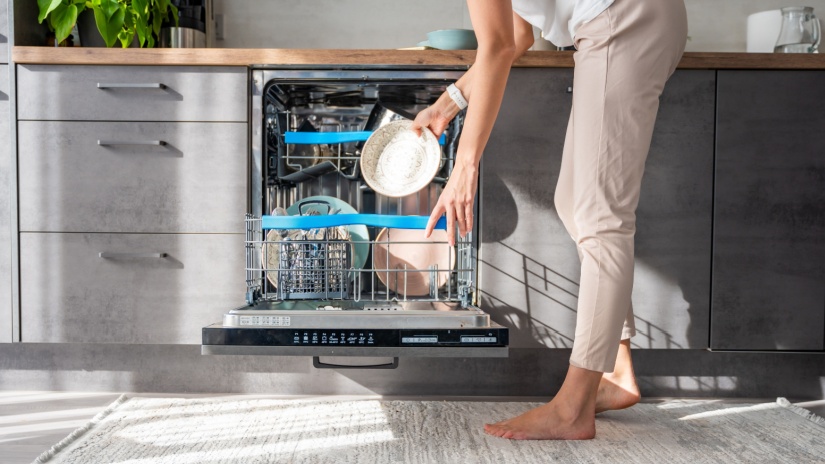Knowledge Centre
How much energy is your dishwasher using?

We live for convenience, right? We order from Uber, and we use smartphones to access the Internet as we go. Convenience is what we do, and because of the culture of ‘everything now’, we also forgo washing dishes at the sink and use a dishwasher instead.
A dishwasher used to be seen as a luxury item but today, it’s more of a necessity to a busy household. We’re all working long hours, so being able to load and run the dishwasher once the kids are in bed is a must.
But does your dishwasher cost you more than hand washing? We’re going to break it down for you here.
Dishwasher vs hand washing
Running your dishwasher does come with an electricity cost, but it uses far less water than washing dishes by hand—up to six times less, in fact. You should also consider that heating the water for hand washing consumes nearly twice as much energy as running a modern dishwasher.
One more benefit of using a dishwasher is that you can often wait until it's fully loaded before turning it on, saving both water and energy. With hand washing, this isn’t as practical since dishes tend to pile up quickly, creating clutter by the sink.
Is a dishwasher water efficient?
Using a dishwasher is much more water-efficient than hand washing dishes. The WELS star rating system allows consumers to easily compare the water and energy efficiency of different dishwashers, encouraging manufacturers to keep improving their designs to use even less water.
Technological advancements have also played a big role. For instance, some modern dishwashers have a feature that stores water from the last rinse cycle and reuses it for the first rinse of the next load.
This allows a full load of dishes (around 144 items) to be cleaned with as little as 9 litres of water, compared to an average of 103 litres for hand washing.
How much electricity does a dishwasher use?
Although it may seem surprising, using a dishwasher is actually much more energy-efficient than washing dishes by hand. This is because the majority of energy in dishwashing is used to heat the water, and dishwashers use far less water overall.
On average, dishwashers in tests consume just over one kilowatt-hour per cycle. If you run your dishwasher once a week, it would only add about $16.38 to your yearly electricity bill.
While more frequent use or choosing a more intense cycle will raise this cost slightly, it’s a small price to pay for saving time and effort—and it’s far cheaper than heating a sink full of water daily.
Is it better for the environment to run a dishwasher?
When thinking about a dishwasher’s impact on the environment, consider three things:
- The materials and energy used to make it.
- The water and energy it will use while running.
- What happens to it when it's thrown away
Making a dishwasher does take more energy than using a sink, but over its 10-15 year life, it uses much less water and energy than washing dishes by hand. This means fewer emissions and less clean water wasted, which is great for places like Australia with limited water supply.
Plus, while dishwasher detergents are alkaline, they don’t harm the planet. So, using your dishwasher wisely is a win for you and the environment.
Is there such a thing as a sustainable dishwasher?
Like most appliances, dishwashers require energy and resources to produce, but they offer significant long-term savings in both electricity and water compared to hand washing. Modern dishwashers are designed to be energy-efficient, often using far less water per load than washing dishes manually.
Over their lifespan, which typically lasts 10-15 years, they help reduce overall resource consumption, making them a greener choice in the long run.
It's also important to know that many of the materials used to make dishwashers, such as stainless steel and certain plastics, can be recycled at the end of their life cycle. This means that, when properly disposed of or sent for recycling, a large portion of the dishwasher can be repurposed, further minimising its environmental impact.
By choosing an energy-efficient model and ensuring it's recycled responsibly, you can help conserve resources both during and after its use.
What size dishwasher should you buy?
Most of us are looking to fill a dishwasher-sized gap beneath our kitchen counters, so a standard full-size dishwasher is the usual choice. These typically measure 60 cm wide, 82-85 cm tall, and 60 cm deep, with extra space needed at the back for ventilation. However, if you're working with a smaller kitchen, a slimline dishwasher might be a better fit, as it can easily tuck under the counter or fit into tighter spaces.
Slimline models are just as tall as standard dishwashers but are narrower at 45 cm wide. While they save space, their energy and water usage are similar to full-size models, so they aren’t quite as efficient overall. If you're renting, a benchtop dishwasher could be a great alternative since it sits on the counter and doesn't require changes to your cabinetry.
As the saying goes, "measure twice, cut once" – it's important to carefully measure the space in your kitchen to ensure your new dishwasher will fit perfectly before making a purchase.
How often should you be running the dishwasher?
Dishwashers work best when used regularly. If left idle for too long, the hoses and seals can dry out and crack, while grease and food residue may harden and clog the delicate internal pipes.
An unused dishwasher can even attract pests, so it's a good idea to keep it running. Plus, using a dishwasher instead of washing by hand saves both time and money.
For optimal efficiency, it's best to wait until the dishwasher is fully loaded before starting a cycle. However, if the dishes inside start to develop an unpleasant smell, it's a sign that it's time to run the machine, even if it’s not completely full.
Are you spending too much?
Using your dishwasher at home might be more affordable per load than you expect, but if you're stuck on an outdated energy plan, you could be spending more than necessary.
If you want to switch to a cheaper plan, or you’re looking for a new energy provider, the best thing to do is get in touch with the team at Compare Energy. We can walk you through the best energy plans for your budget and location, so call 1300 790 106.

